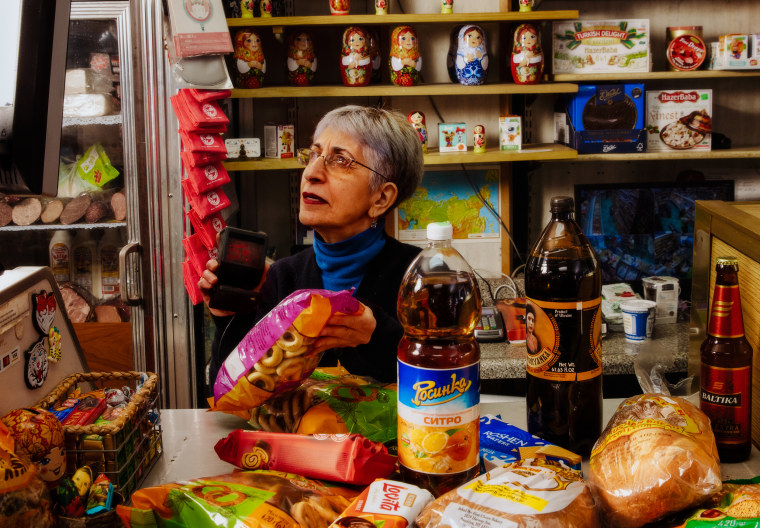For three years, Gleb Gavrilov and his mother, Marina Begiv, have run a small store in the Washington Heights neighborhood of New York that specializes in foods and other products from Russia, Ukraine and other Eastern European countries.
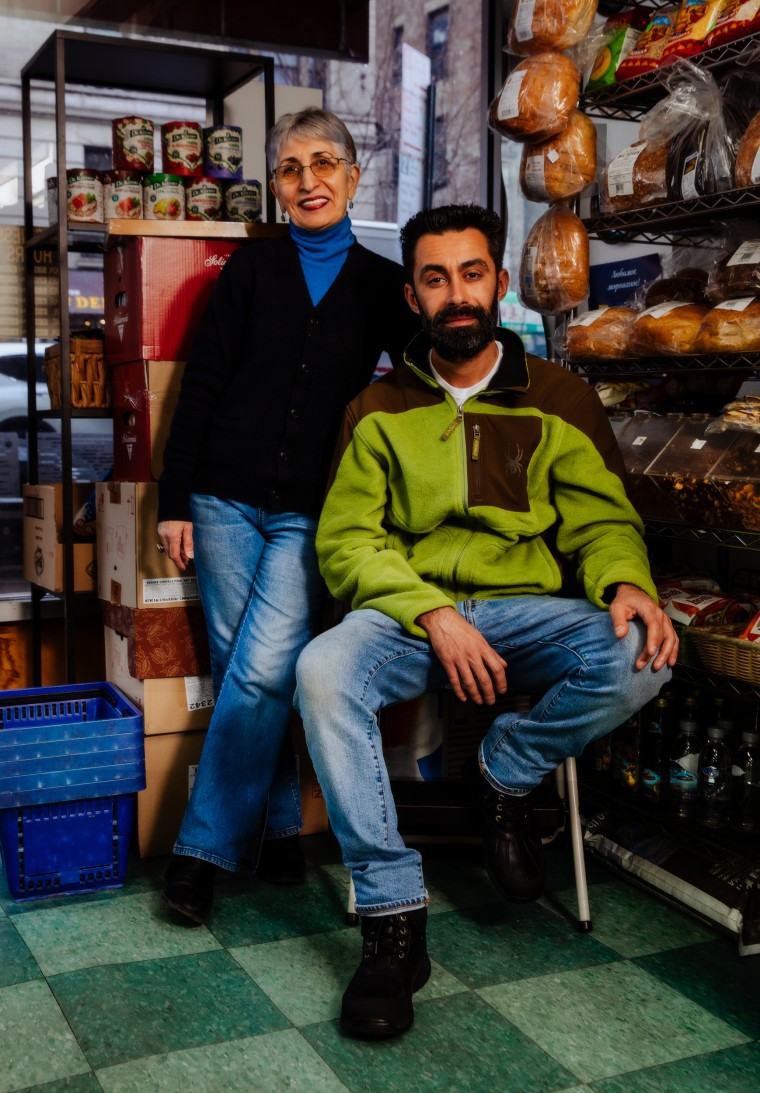
The shelves of their store, Moscow on the Hudson, are lined with neatly stacked cans of spats fish from Lithuania and Norwegian cod liver. There are Ukrainian honey cakes in the deli case, and jars of birch tree juice, which Ukrainians jokingly call “radiation water” in reference to the 1986 Chernobyl nuclear disaster.
The store, not much bigger than a New York hotel room, has been serving a steady clientele of Serbian, Ukrainian, Russian and Georgian shoppers since it opened under a different name two decades ago. It weathered the Great Recession and stayed afloat during the pandemic by ramping up its online business. But Gavrilov is worried that the war in Ukraine, and its impact on Eastern European exports, could bring his business to a halt.
"With the whole Ukraine and Russia fighting, I don’t think they’ll be sending anything to America,” said Gavrilov, 39, who immigrated to the U.S. from Georgia in 1992, with his now 70-year-old mother. She worked at the store for years before she bought the business.
About 60 percent of the products at Moscow on the Hudson are imported from Russia and Ukraine through distributors based mainly in Brooklyn. Gavrilov said vendors have been urging customers to place orders for popular products like Russian cereals, Ukrainian candies and specialty chocolates as soon as possible, before supplies run out.
“I’m a little worried I won’t fill the store,” Gavrilov said.
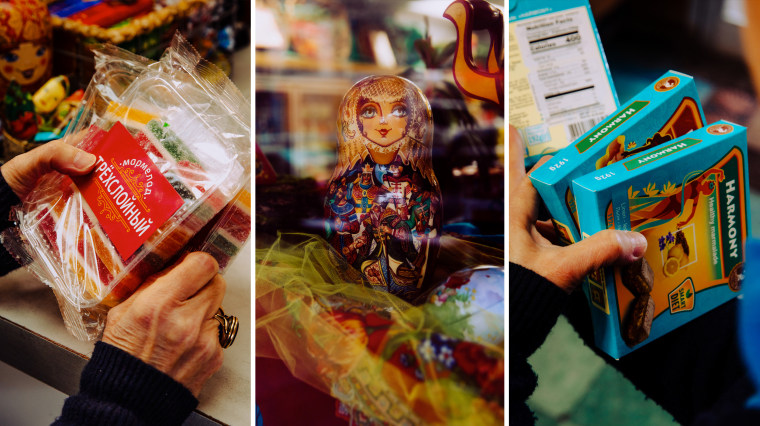
Small businesses like Gavrilov’s have found themselves caught in the mounting international effort to punish Russia economically for invading Ukraine. In 2019, the U.S. imported about $69 million in agricultural products from Russia, led by snack foods, nuts, vegetable oils and dairy products, the types of items that small specialty stores like Moscow on the Hudson depend on to stock their shelves. The steady escalation of the war with Ukraine, and the ripple effect of other sanctions, had already slowed exports to a near standstill. Then, on Friday, President Joe Biden said the U.S. would move to revoke Russia’s “most favored nation” trading status, which could lead to higher tariffs on some Russian imports. He also signed an executive order blocking imports of Russian fish, seafood, alcohol and nonindustrial diamonds.
At Krasniy Octyabr, a wholesale distribution company in Brooklyn, new orders from Moscow stopped cold about a week ago, after shipping companies including Maersk and OOCL suspended service to Russia. Grigoriy Katsura, who emigrated from Ukraine in the 1990s and owns the company, said in his 25 years in the import business, he’s never seen anything like what’s happening now.
“Everything will go up now because what happened in the world is not normal.”
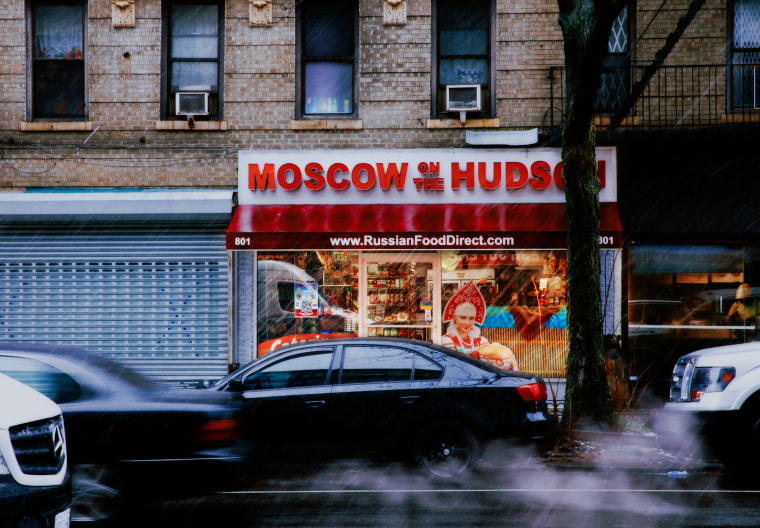
Katsura imports about 300 shipping containers of products a year, including Eastern European juices, teas, herring, soda and sunflower seeds. He is also the exclusive U.S. distributor of Russian Red October chocolates, made by one of the oldest candy manufacturers in Moscow. He said his hundreds of retail clients have been rushing to order goods before his 20,000-square-foot warehouse is empty. He thinks he has enough inventory to fill orders for another six weeks. After that, he isn’t sure what will happen.
“It’s hard to understand the plan because you cannot change what people like for years suddenly for something different,” said Katsura, 45, who was born in Ukraine. “Of course you can get something similar from Europe, but it’s going to be much more expensive.”
At PV Euro Market in Parma, Ohio, Milan Cvjeticanin has been selling European specialties to the local Eastern European and Balkan communities since 2004. He said almost anything you’d find at a grocery store in Ukraine, Poland, Serbia or Croatia, you can find at PV Euro — including canned fish and Ukrainian breads. He said about 20 percent of his inventory is imported from Russia and Ukraine, and getting those products won’t be the only challenge in the near future.
“The Russia-Ukraine conflict is going to amplify all those transportation cost increases even more because the energy prices are going up.”
Cvjeticanin, who came to the U.S. from Yugoslavia in 1992, said prices for imports already soared 30 to 40 percent during the pandemic, as a result of shortages and supply chain snarls. And there’s a limit to how many more increases he can absorb, since they’ve already eaten into his thin profit margins. He said there’s also a limit to how much he can raise prices before people stop buying.
“The average citizens are the ones who are going to be paying for the highest cost,” he added. “It just breaks my heart.”
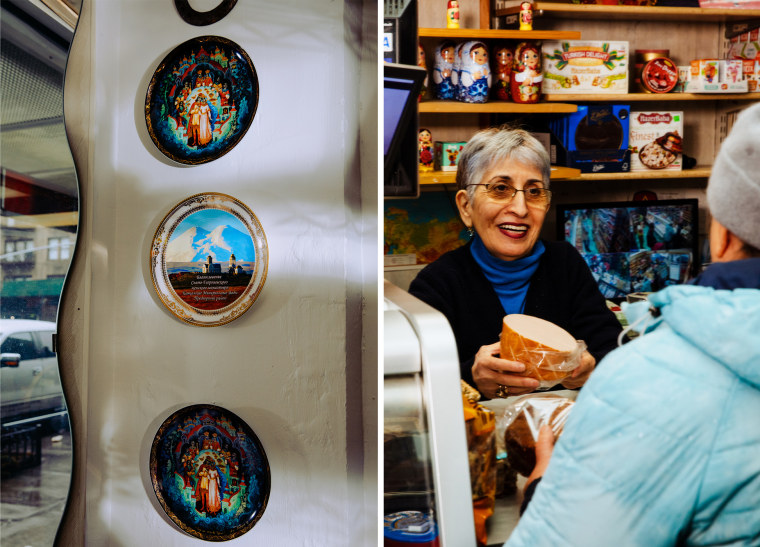
Some business owners are looking to source similar products from Eastern European countries that have not been affected by the war. Arthur Shwarts, who owns Golden Hex in Cary, North Carolina, said he’s evaluating new vendors in Poland and the Balkans, but he hasn’t placed any orders yet. In the meantime, Shwarts is stocking up on whatever goods he can get his hands on that have a long shelf life.
“Right now the whole logistics is broken,” said Shwarts, 50, an Armenian immigrant. “We’re trying to survive.”
A shortage of merchandise isn’t the only problem many of these small stores are facing.
For years, the words “Russian Food” were spelled out in big letters across Moscow on the Hudson’s front window. After Russia invaded Ukraine, Gavrilov had them removed. He said people assume the store is Russian-owned and he “didn’t want anybody to break the glass.”
He said business has slowed in the past two weeks, but he still has loyal customers. And if he can no longer get the Russian and Ukrainian products they want, he’ll fill the empty shelves with products from countries like Poland or Bulgaria. But it won’t be an easy transition.
“Some people get used to it and like certain products close to their home,” he said. “It’s sad because some guy wants to play his millionaire games.”
